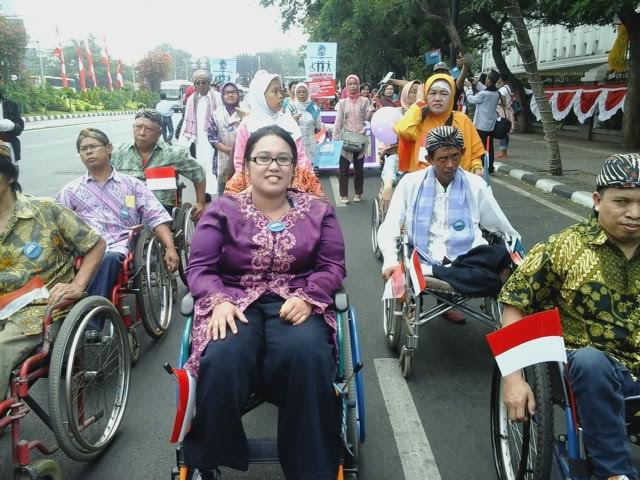 The inclusion of the Draft Law on Persons with Disabilities on the priority list of the 2016 National Legislation Program (Prolegnas) does not necessarily make people with disabilities in Indonesia feel relieved. The reason is, PATTIRO believes that up to now there are still several things in the bill that are not in line with the expectations of disabled people, especially related to the number of ministries responsible for the sector.
The inclusion of the Draft Law on Persons with Disabilities on the priority list of the 2016 National Legislation Program (Prolegnas) does not necessarily make people with disabilities in Indonesia feel relieved. The reason is, PATTIRO believes that up to now there are still several things in the bill that are not in line with the expectations of disabled people, especially related to the number of ministries responsible for the sector.
“Friends with disabilities throughout Indonesia feel that the Ministry of Social Affairs should not be the sole person responsible for the sector. “This is because the problems faced by people with disabilities are not only in the social sector, but also in the education, health and other sectors where the Ministry of Social Affairs is not responsible in that area,” said PATTIRO researcher Didik Purwondanu.
Apart from that, Didik revealed, so far the Ministry of Social Affairs, through its social services in the regions, has only focused on solving downstream problems. “So far, social services usually only provide assistance in the form of cash or basic necessities. “But what does that mean if friends with disabilities cannot seek treatment and/or go to school because the health and education service systems in Indonesia cannot accommodate their needs,” concluded Didik.
For this reason, Didik said, the government needs to appoint another ministry to take responsibility for solving various problems faced by people with disabilities. Didik said that at least three other ministries such as the Ministry of National Development Planning/BAPPENAS, the Ministry of Home Affairs, and the Ministry of Law and Human Rights must be involved.
Didik explained that the infrastructure and health and education services provided by the government have not accommodated the needs of people with disabilities, making it difficult for them to carry out activities like the general public. “For example, the guiding blocks installed on the sidewalks are not installed properly, making it difficult for blind friends to walk. “The infrastructure and health and education services are also not friendly to people with disabilities,” said Didik.
Therefore, according to Didik, the Ministry of National Development Planning/BAPPENAS must play a role. He said that BAPPENAS could play a role by mainstreaming disability issues into development planning and government policy formulation. By doing these two things, the government is one step closer to creating an environment that supports and facilitates interactions between disabled people and society. “So far, people with disabilities have limited space for movement and interaction because our environment does not support it. “By creating this environment, disabled people can be more independent because they can interact more freely with the community around them even without the help of their families or companions,” explained Didik.
Didik added, so that the implementation of mainstreaming disability issues can run well and produce significant results, the central government must also involve regional governments, both provincial, district/city and village. For this reason, Didik said, the role of the Ministry of Home Affairs is really needed because governments at the regional level tend to comply more with orders from the Ministry of Home Affairs. “The Ministry of Home Affairs, through the Minister of Home Affairs Regulation concerning Guidelines for Preparing APBD, can ask regions to allocate funds for people with disabilities so that the implementation of development and implementation of policies can produce significant results,” added Didik.
Apart from development and policy making that must accommodate the needs of people with disabilities, legal protection for people with disabilities which is still weak must also be improved. Didik explained that until now there are still many people with disabilities, especially women with disabilities, who experience cases of violence. However, due to the lack of protection and legal assistance provided by the government, many cases of violence remain unresolved. “Friends with disabilities often lose in cases of violence against them because they cannot afford the services of a lawyer who can help them in court. “For this reason, the Ministry of Law and Human Rights can play a role by providing free legal aid services,” said Didik.
Didik said that it would not be a problem if the Ministry of Social Affairs was made the main person responsible for disability issues in Indonesia. However, he emphasized that the Ministry of Social Affairs would not be able to handle all the problems of people with disabilities without the help of other ministries. Apart from carrying out its role, the Ministry of Social Affairs together with civil society can also monitor the implementation of development and implementation of mutually agreed policies. “With the cooperation of the four ministries, it is hoped that the problems faced by disabled people can be handled well so that they can be more independent and interact freely with their surrounding environment,” said Didik.




